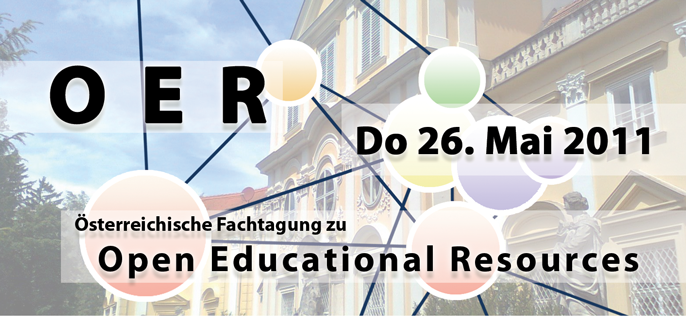 Bevor ich mich in die Osterferien verabschiede, muss ich noch hinweisen, dass das iUNIg-Team wiederum eine Tagung organisiert. Dieses Mal laden wir zum Thema „Open Educational Resources“ und wollen diese von vielen Seiten betrachten. Neben den Keynotes von Grainee Conole, Sandra Schön und Sabine Zauchner bieten die Partneruniversitäten Workshops an, die das Thema aus Sicht ihrer Institutionen aufgreifen. Die TU Graz wird dabei über ihre Open-Content-Strategie berichten. Wir freuen uns auf viele TeilnehmerInnen und spannende Diskussionen. Also hier gibt es alle Details und anmelden nicht vergessen 🙂 .
Bevor ich mich in die Osterferien verabschiede, muss ich noch hinweisen, dass das iUNIg-Team wiederum eine Tagung organisiert. Dieses Mal laden wir zum Thema „Open Educational Resources“ und wollen diese von vielen Seiten betrachten. Neben den Keynotes von Grainee Conole, Sandra Schön und Sabine Zauchner bieten die Partneruniversitäten Workshops an, die das Thema aus Sicht ihrer Institutionen aufgreifen. Die TU Graz wird dabei über ihre Open-Content-Strategie berichten. Wir freuen uns auf viele TeilnehmerInnen und spannende Diskussionen. Also hier gibt es alle Details und anmelden nicht vergessen 🙂 .
[presentation] L3T assists m-Learning
My today’s presentation on „L3T assists m-Learning“ at mobile learning conference in bremen is now online available:
[L3T] L3T goes Learntec
Es freut uns, dass wir etwas ankündigen können: Das Buch wird online am 1.2.2011 freigeschaltet und zwar live auf der großen E-Learning-Messe Learntec in Karlsruhe.
Wir überlegen auch eventuell einen Livestream von dort durchzuführen und hoffen eure Unterstützung auf den Sozialen Netzwerken, damit das Ereignis angemessen über die Bühne gebracht werden kann. Also den 1.2.2011 rot im Kalender vormerken – L3T GOES ONLINE.
Abstract:
Im Rahmen des Vortrags stellen wir das Projekt L3T vor. Mehr als 130 Autoren/innen, 80 Gutachter/innen und weitere Mitarbeiter/innen haben beigetragen, um ein Lehrbuch für Lernen und Lehren mit Technologien zu erstellen und online zur Verfügung zu stellen. Von der Idee, dem Call for Chapter Über die Zusammensetzung der Teams, dem Einreich- und Reviewprozess wird besonders aus dem Blickwinkel von Kollaboration und Kooperation gezeigt, wie sich das Projekt entwickelte und damit stark auf Werkzeuge und Methoden des Web 2.0 setzte. Am Ende der Präsentation werden die Kapitel des Lehrbuchs live online freigeschaltet und damit der Öffentlichkeit zur Verfügung gestellt. Weitere Informationen über das Projekt finden Sie unter https://l3t.tugraz.at
[podcast] E-Books at TU Graz
The talk of Walther at this year EADIM conference about „E-Books at TU Graz“ is now online available. The slides have already been published here.
[presentation] E-Books at TU Graz
Our today’s presentation on e-Books development at this year EADIM conference is now online available:
[fnma] 20. Tagung des Vereins Forum neue Medien Austria
 In meiner Rolle als Vizepräsident des Vereins Forum neue Medien Austria freut es mich die 20. Tagung anzukündigen, welche den Titel „Hochschullehre im Jahre 2020“ trägt. Stattfinden wird sie an der
In meiner Rolle als Vizepräsident des Vereins Forum neue Medien Austria freut es mich die 20. Tagung anzukündigen, welche den Titel „Hochschullehre im Jahre 2020“ trägt. Stattfinden wird sie an der
Höhere Graphische Bundes-Lehr- und Versuchsanstalt in Wien „die Graphische“.
Besonders freut es uns, dass es uns gelungen ist auch einen Call for Participation zu erstellen, wo die Bildung von Arbeitsgruppen zu hochschulübergreifenden Themen ermöglicht werden soll:
Das Forum neue Medien Austria (fnm-austria) schreibt hiermit drei einjährige Leitungen von drei Arbeitsgruppen zu den Schwerpunktthemen „Qualität der Hochschullehre“, „Austausch von hochschuldidaktischen Modellen“ und „Technologiegestützte Lehrinnovation“ aus. Einreichungen können bis spätestens 17. Oktober 2010 erfolgen, wobei alle Mitglieder des Forum neue Medien Austria einreichberechtigt sind. Der Call wendet sich an Personen, die die Koordination der Arbeitsgruppenmitglieder sowie die Zusammenfassung der Ergebnisse übernehmen wollen. Pro Arbeitsgruppenleitung stehen eine Aufwandsentschädigung in der Höhe von 3.000 Euro sowie Reisekostenabgeltungen in der Höhe von maximal 5.000 Euro zur Verfügung. Die Präsentation der Arbeitsgruppenleitungen sowie die Konstituierung der Arbeitsgruppen erfolgt am 18. November 2010 im Rahmen der 20. fnm-austria Tagung in Wien.Wir freuen uns auf eine gute Zusammenarbeit!
Hier das genaue Tagungsprogramm und der Call for Participation.
[publication] Get Granular on Twitter – Tweets from a Conference and their Limited Usefulness for Non-Participants
Our publication at this year World Computer Congress about „Get Granular on Twitter – Tweets from a Conference and their Limited Usefulness for Non-Participants“ is now online as draft version available.
Abstract:
The use of microblogging applications (especially Twitter) becomes common in different settings. Nowadays, active conference participants post messages on microblogging platforms to exchange information fast and in real- time. Recent research work addressed quantitative analyses in terms of number of tweets or active Twitter user in a specific time period. In this publication we look at the content of the contributions. It can be shown that only a few posts are of interest for non-participants of the corresponding event and that a meaningful usage of a microblogging application needs carefulness.
Reference: Ebner, M., Mühlburger, H., Schön (aka Schaffert), S., Schiefner, M., Reinhardt, W., Wheeler, S. (2010) Get Granular on Twitter – Tweets from a Conference and their Limited Usefulness for Non-Participants, N. Reynolds and M. Turcsányi-Szabó (Eds.), KCKS 2010, IFIP AICT 324, pp. 102–113
[podcast] Academic Use of Microblogging
The podcast of my talk at AIECS 2010 „Academic Use of Microblogging“ is now online available. The slides are already published here.
[presentation] Academic Use of Microblogging
My presentation of today at Conference on „Advances of Informatics and Earth&Cosmic Sciences“ in Graz:
[presentation] Capture Your University
Our contribution to this year IADIS e-Learning conference in Freiburg/Germany is about our podcasting/streaming activities. Walther will give today the presentation on „Capture Your University„:
